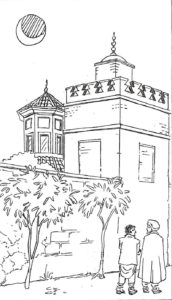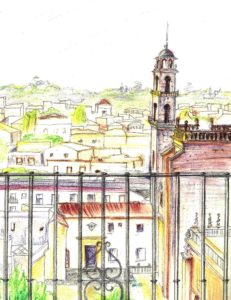Authentic – adjective genuine, authoritative, true; (of writing) trustworthy, as setting forth real facts.
Verisimilitude – noun the quality of seeming real or true; an appearance of truth or reality.
Fiction writers know about both and this has a specific relevance to writers of historical fiction.
 So, when writing Reconquista, I was anxious that it showed real historical events, like the siege of Jerez in 1264, in as authentic a way as possible. The siege took place, even if historians debate the actual date upon which the city fell – see The wrong saint? ). But my portrayal of it is almost certainly inauthentic too – there are no records of what form the final assault took, so I made it up.
So, when writing Reconquista, I was anxious that it showed real historical events, like the siege of Jerez in 1264, in as authentic a way as possible. The siege took place, even if historians debate the actual date upon which the city fell – see The wrong saint? ). But my portrayal of it is almost certainly inauthentic too – there are no records of what form the final assault took, so I made it up.

Often the line between authenticity and verisimilitude is blurred when it comes to characters in historical fiction who really existed. Most of the characters in Reconquista are products of the imagination, excepting the great and the good. So, King and Emir were real people, placed in real locations, though fictional thoughts and actions are given to them in the service of the narrative.
The Governor of Cadiz was a real person, though I don’t know whether or not he would really have done the things which the novel has him do, but as long as his character is consistent that’s okay. Readers of historical fiction aren’t, in the main, troubled by this. As long as one doesn’t have people, fictional or real, appearing in the past who couldn’t have been there, readers are generally content. So no Jack the Ripper or Neil Armstrong in thirteenth century Jerez, (though this could happen in science fiction and fantasy writing).
 By the same token, the writer of historical fiction can’t just transplant modern technology or modern mores into the past. No pistols or rifles in Reconquista then and no ‘liberated’ females, self-determining girls or women, independent and free in the sense that women are independent and free in 2017 Britain. My heroine has her adventures in male disguise.
By the same token, the writer of historical fiction can’t just transplant modern technology or modern mores into the past. No pistols or rifles in Reconquista then and no ‘liberated’ females, self-determining girls or women, independent and free in the sense that women are independent and free in 2017 Britain. My heroine has her adventures in male disguise.
Sometimes, however, these elements compete and that which is authentic doesn’t seem true. When researching for a sea-battle I found out quite a lot about the ships and naval weaponry of the time. I was surprised to discover that the Moors had developed a naval weapon, a canister containing explosive which was propelled through the water, a sort of prototype torpedo. Something interesting to include I thought.
But I didn’t, because I realised that readers wouldn’t credit it. The  same happened with the name of a minor character. I originally called him Idris, an authentic Arab name, but everyone (including my editor) who read drafts of the book asked me why I’d placed a Welshman in 1264 Jerez. In vain I explained.
same happened with the name of a minor character. I originally called him Idris, an authentic Arab name, but everyone (including my editor) who read drafts of the book asked me why I’d placed a Welshman in 1264 Jerez. In vain I explained.
The damage was done, the spell had been broken. Readers weren’t thinking about what the hero would find when he returned to his half destroyed home, but why his neighbour had a Welsh name. The same would have happened with the sea weapon. So verisimilitude beats authenticity, in these instances at least.
If you enjoyed reading this article you might also enjoy History Writing Provender The Real Thing


 RSS – Posts
RSS – Posts